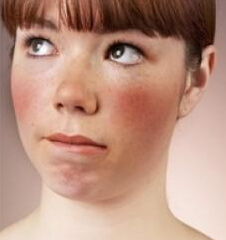Cyclotymia in adults
 cyclothymic disorder - a condition that occurs without regard to any other external causes, the disease does not reach the manic-depressive syndrome, it is in the same group with depressive neurosis. Such a disorder affects women twice as often as men in the 18-45 age group. Most receive specialized psychiatric care on an outpatient basis, and only one in eight requires hospitalization.
cyclothymic disorder - a condition that occurs without regard to any other external causes, the disease does not reach the manic-depressive syndrome, it is in the same group with depressive neurosis. Such a disorder affects women twice as often as men in the 18-45 age group. Most receive specialized psychiatric care on an outpatient basis, and only one in eight requires hospitalization.
Modern systematics has divided cyclothymic disorder into cyclothymia and dysthymia. Clinically manifested by depression and hypomania.
Cyclotymic depression
Not characterized by vivid signs of melancholy and unreasonable pessimism, depression and despondency. During the day there is a feeling of longing, anxiety, guilt. But unlike traditional depression, these conditions are very short and unstable. Anguish can appear several times during the day sporadically( from a few minutes to half an hour).In the morning, a sense of shame, low self-esteem, professional unfitness may appear, but activity prevails throughout the day, the patient continues to work and perform his daily activities, although this is given to him with some difficulty. Unlike depression, cyclical depression passes without a state of fear, stupor, stupor, confusion.
Apathy depression
Characterized by a decrease in vital tone, impoverished mimicry, speech becomes monotonous, movements slow, expressed indifference to the surrounding world. But suicidal thoughts are rare.
Cyclotymic depression
With the phenomena of mental anesthesia characterized by a lack of feelings of satiety, thirst, sleep, etc., pursues a feeling of dissatisfaction in themselves.
somatisation dysthymia
Characterized by the appearance of complaints of feeling unwell, poor sleep with fairly frequent awakenings, shortness of breath, palpitations, constipation, dominated by feelings of anxiety and depression( expressed in the freezing cold in the stomach, burning sensation in the bowel area or throat, pinching in the stomach), reducedSelf-esteem, pessimism.
characterological dysthymia
characterized grumbling grumpy and picky, high demanding relatives, sick all the blame for his troubles are blaming others. Over time, symptoms become characteristics of the patient.
dysthymia type "samoistyazayuschey depression»
characterized by a sense of his own inferiority, lack of conformity himself ethics requirements, there are ideas of their own depravity, guilt himself throughout his actions and even more not guilty.
Exacerbated dysthymia
Characterized by a lively motor and distractibility against the background of awareness of mental distress. Patients feel that they are deeply unhappy, joy and pleasure are not for them, however, behave in public with enthusiasm, wit it, too fidgety, talkative and energetic, constantly feel at ease. Only in professional activity feel comfort.
Atypical depression
encountered more frequently in adolescence and early adulthood, representing the erased forms of depression, manifested in sleepiness, a phenomenon that simulate cardiovascular disease, and others., Until the frustration of drives( substance abuse, anorexia, etc.).
Hypomania - a weakened form of mania, characterized by a state of natural and pleasant ascent, the appearance of serenity, tenderness, careless contentment, euphoria, increased talk, irritability, shortening of sleep time. Hypomanias caused by the abuse of psychoactive substances, occur briefly( several hours - several days), arise after the use of the drug, after the attack comes fatigue, shame, apathy. Hypomania occurs against the background of senile dementia;After severe infectious diseases and after operations in the elderly;In people who abuse alcohol, suffer from cardiovascular and endocrine diseases.
Hypertymia - an increase in vitality, characterized by unreasonable cheerfulness and optimism, boasting, conviction of their superiority and originality. Any criticism is perceived by displays of anger, irritability, faultiness. It can grow into grumbling hypomania.
The course of cyclothymia is manifested by diffuse seizures, i.e. The condition preceding the illness after the termination of a separate attack is completely restored. In most patients, the episode repeats in 3 months to 6 months and passes after a 10-fold repetition. In some patients, the recurrence of seizures is observed in a year, and the depression is prolonged to 5-8 years. The disorder occurs suddenly, literally within a few hours the symptoms of depression or hypomania develop. A similar suddenness is characterized by the attenuation of the attack.
Classify 3 cycles:
- a two-day cycle;
- fast cycle( depression and mania change each other every few days, up to weeks);
- seasonal cycle( with the formation of seizures in the fall and spring), as well as "winter depression" as an independent form.
Dysthymia happens:
- primary - not associated with mental illness, develop at the age of 21 years;
- secondary - against a background of somatic or mental illness;
- with early start;
- with late start;
Prolonged dysthymia is usually accompanied by inhibition of adaptive properties and a decrease in the quality of life.
Treatment of cyclotymia
The main goal of treatment is to prevent repetitive attacks and achieve the disappearance or alleviation of symptoms. Treatment should be aimed at arresting the current attack, improving the duration of remission and its quality. The main method of treatment - pskhopharmacotherapy in combination with another therapy. In this case, antidepressants, tranquilizers, hypnosis, psychotherapy can be used. Hospitalization is indicated for the application of more active methods of treatment, the duration of it is strictly individual.
Psychotherapy is aimed at treating the disease itself or has an auxiliary function. Use pathogenetic therapy, as an independent direction, can only specially trained specialists and then under certain conditions. But any treatment should include a psychotherapeutic aspect. The goal of psychotherapy is the emergence of a critical attitude toward the state, the correction of internal attitudes, the creation of an adequate internal picture. The strategy of psychotherapy is aimed at correcting the existing condition, and also concerns the immediate environment of the patient to prevent the occurrence of seizures.
Forecast
The outcome of cyclothymia is favorable. Multiple relapses and perennial course do not lead to the destruction of personality. The attacks of the disease result in a recovery with continued ability to work and social activity.
Only occasionally hypomania can lead to suicidal attempts, but adequate interaction between the doctor and the patient significantly improves the prognosis, as the doctor manages to identify suicidal thoughts. The risk factors include the elderly age, the presence of severe chronic diseases, alcohol dependence, loneliness.
A less favorable prognosis for dysthymia, so it needs more attention, it refers to the choice of treatment and recovery programs.



